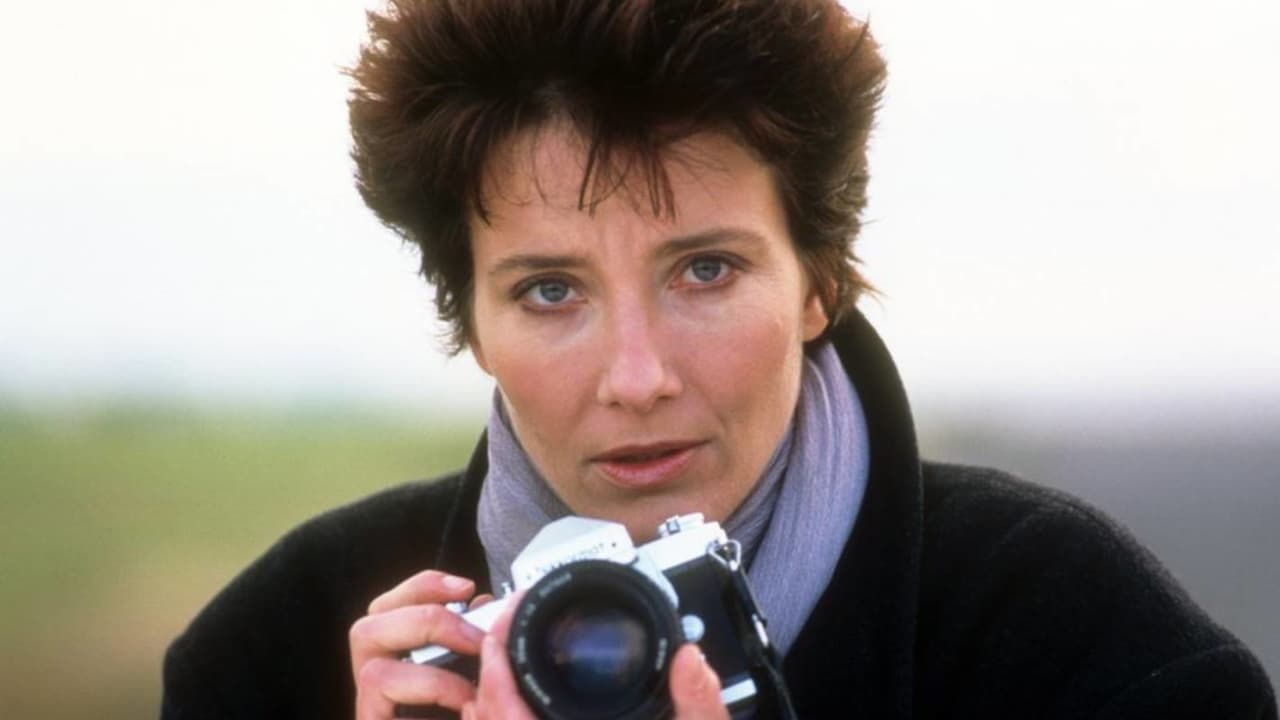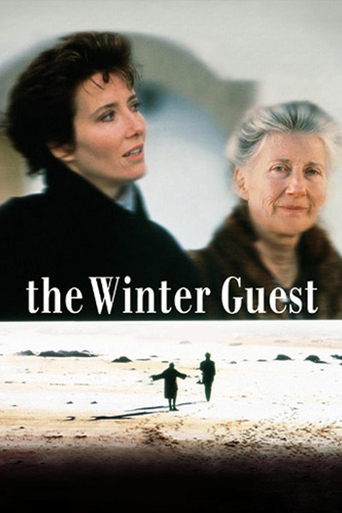

Four interconnecting stories: The main one being a woman argues with her elderly, busybody mum about a possible move to Australia for her and her son after the untimely death of her hubby. Meanwhile, said teen has his first sexual experience with a girl who's been stalking him for months. Also on the agenda are two boys adventures while playing truant from school, and a couple of old friends taking a coach ride to attend a funeral. All this is set in the template of a very wintry Scotland, where even the sea has frozen over.A slow burning meditation on life among different generations, it manages to be quietly moving without having to resort to overdramatising. All of these people FEEL real, and their segments are each satisfying in their own way, even interlinking at certain points. As a demonstration in acting its a masterclass, with special honours reserved for Phyllida Law as the overbearing, interfering mother from Hell. Probably not a classic, but gratifying enough. And the beautiful white landscape is a star all by itself.. 6/10
... View MoreFor his debut as a film director, Alan Rickman has chosen material with which he is very familiar. The Winter Guest is a play he commissioned and directed on the stage before adapting it for the screen in collaboration with playwright Sharman Macdonald. Rickman's familiarity with the material and his considerable experience of working in front of the camera seem to have prepared him well for the making of an exceptional film.Emma Thompson plays Frances, a photographer whose husband has recently died after a long illness, leaving her to raise a teenaged son. Frances and Alex are visited by Elspeth, Frances' mother (played by Thompson's mother, Phyllida Law). Frances cannot find direction in her life and has surrounded herself with the photographic record of her husband and his illness. Elspeth, whose health is failing, cannot rely on the support of a daughter who is unable even to care for herself. Alex is caught between memories of his father and an emotionally absent mother. On the coldest day in memory, the sea around this remote Scottish village, like the lives of Frances and those she loves, has frozen as far as the eye can see.Together, cinematographer Seamus McGarvey and production designer Robin Cameron Don, have created an environment for the story which mirrors the desolate emotional world in which the characters find themselves. The colours are muted to the point that the film sometimes seems to have been shot in black and white, with only tones of grey to give it texture. Some shots are composed with a rigid symmetry, others with a sweeping, aerial freedom. This contrast is timed to echo the themes of dependency between parent and child, the purpose of Death and grieving, and the tension between the emotion and the intellect.Rickman uses cinematic devices like a veteran. His symbols and recurring motifs of water, fire, and even fur, are used to considerable effect throughout. So too, does he use narrative techniques. Two truant school boys, not originally connected with Frances and her mother, are drawn into their story and used as contrast. In their narcissistic search for pleasure and adventure, they depict the base side of life against Frances' cold intellectual remoteness. Nita, a young woman with romantic designs on Alex, is almost able to draw him out with her passionate attitudes and her aggressive, juvenile, almost animalistic desires. Chloe and Lily, two elderly women of the village whom we meet as they wait for a bus to take them to a funeral, demonstrate the constant presence of death and how it can be embraced and normalised. They pore over obituaries and discuss the rituals of death with a mundane, child-like preoccupation. Their closeness further develops the themes of dependency and need.Some may find the restraint of the film difficult to endure. Characters seem ever on the edge of lashing out or breaking down. There is a contained energy at work which is only seldom evident in their actions. This restraint is deliberate. It becomes the central motif in the film's construction. The story is about the frictions which exist between what we need and what we can give, between parent and child, between passion and logic, life and death. The performances are tight and restrained because the characters, in their efforts to understand and adapt, must be also.The Winter Guest is an excellent film. Rickman uses visual, auditory and narrative techniques like a veteran. There are tremendous performances by all; especially Law (Elspeth) , Arlene Cockburn (Nita) and Sean Biggerstaff (Tom). A wonderful capture of atmosphere and production design is enhanced by exemplary cinematography and held together by an intelligent, controlled and dramatically charged script.
... View MoreFirst I wanna mention the music of TWG by Michael Kamen. I was shocked to find that he had passed away in 2003 from the Academy Awards "In Memoriam". He poetically and gracefully used the simple piano music in TWD, which led the audience go into the alienated world with warm spirit.I have to admit that I bought this film because I'm a Rickman fan. I was just curious about his first & only film directing. It's adapted from the play by Sharman Macdonald, who also worked on the film script with Alan. In 1997's Chicago Film Festival,TWD even "beat" talented Ming-liang Tsai's "The River", awarded with the Golden Hugo.In my opinion, there's no such thing as "win " or "lose" in a film festival. But this fact also pushed me to see TWD.I can't say there's nothing awkward in TWD. The way they edited the film, say, is not smooth enough; it just kept on reminding me that it's adapted from a play. But also, the off-screen voice was well-used in a few scenes. For instance, Alex told the girl Nita about the love between his Mom & Dad(after he found the house seemed to be "haunted"), overlapped with her mom Frances'(Emma Thompson) breakdown on the mountain. They also perfecly made the opening scene of Mom & Daughter. Mom is walking and cleaning the house; the Daughter stays in the bathroom to keep herself away from Mom's nagging. They dialogued in this way. We can clearly see how they get along. Not too friendly, but caring for each other. You can find Frances grieve over sth, in her private space. Cinematographer Seamus McGarvey("The Hours", "The Wit") was so great that he captured some dignity or beauty of life in his long take. I particularly like the scene when Frances held her mother's hand to climb up the hill. Suddenly her mother revealed some part of her fragility. The wall that she supported with also rubbed her hand, along with her nagging and France's silence, this long-take would be such a memorable moment for this film. The high-angle shot of the bus in the field, what can I say, just tells what I mean of "dignity of life". Two old women took the bus to attend a funeral. You never knew where life is going to take you.It's a story of "4 pairs of people". It's important to emphasize on this form the scriptwriters took. While too many films talked about the loneliness of modern people, TWD walked the other way to present life itself. People in TWD may not really be able to understand each other; at least they have a company to walk on the slippery road.Being as a actor-turned-director(especially a British actor), Rickman gave lots of space for the cast. I hope he can direct more. Some places need to be improved, but still Bravo for Mr. Rickman's heart-warming debut.
... View MoreAlan Rickman has made a breathtakingly beautiful, haunting movie that sucks you in and won't let you go until long after the credits have finished rolling. The story centers on four couples: a mother and her grieving adult daughter, her son and the girl who takes a fancy to him, two young teenage boys going through all the troubles of puberty, and two old ladies with nothing left to do but attend funerals. Their stories are intervowen, against the backdrop of a gorgeous Scottish winter landscape, which is threatening to take over and swallow them whole. They all have to find their paths in life, realize what's important and what's worth living for.The pace of this movie is very slow, so granted, it's not for everyone. But if you like your movies bittersweet, with reality seeping out of every pore, then this is a film for you.
... View More